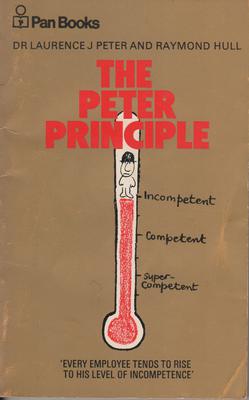Laurence J. Peter's research led to the formulation of the Peter Principle well before publishing his findings.
Summary
In the first two chapters, Peter and Hull give various examples of the Peter principle in action. In each case, the higher position required skills that were not required at the level immediately below. For example, a competent school teacher may make a competent assistant principal, but then go on to be an incompetent principal. The teacher was competent at educating children, and as assistant principal, he was good at dealing with parents and other teachers, but as principal, he was poor at maintaining good relations with the school board and the superintendent. [3] : 27–9
In chapter 3, Peter and Hull discuss apparent exceptions to this principle and then debunk them. One of these illusory exceptions is when someone who is incompetent is still promoted anyway—they coin the phrase "percussive sublimation" for this phenomenon of being "kicked upstairs" (cf. Dilbert principle). However, it is only a pseudo-promotion: a move from one unproductive position to another. This improves staff morale, as other employees believe that they too can be promoted again. [3] : 32–3 Another pseudo-promotion is the "lateral arabesque": when a person is moved out of the way and given a longer job title. [3] : 34–5
While incompetence is merely a barrier to further promotion, "super-incompetence" is grounds for dismissal, as is "super-competence". In both cases, "they tend to disrupt the hierarchy." [3] : 41 One specific example of a super-competent employee is a teacher of children with special needs: they were so effective at educating the children that, after a year, they exceeded all expectations at reading and arithmetic, but the teacher was still fired because they had neglected to devote enough time to bead-stringing and finger-painting. [3] : 39
Chapters 4 and 5 deal with the two methods of achieving promotion: "push" and "pull". "Push" refers to the employee's own efforts, such as working hard and taking courses for self-improvement. This is usually not very effective due to the seniority factor: the next level up is often fully occupied, blocking the path to promotion. [3] : 52 "Pull", on the other hand, is far more effective and refers to accelerated promotion brought about by the efforts of an employee's mentors or patrons. [3] : 48–51 [6]
Chapter 6 explains why "good followers do not become good leaders." [3] : 60 In chapter 7, Peter and Hull describe the effect of the Peter principle in politics and government. Chapter 8, titled "Hints and Foreshadowings", discusses the work of earlier writers on the subject of incompetence, such as Sigmund Freud, Karl Marx, and Alexander Pope.
Chapter 9 explains that, once employees have reached their level of incompetence, they always lack insight into their situation. Peter and Hull go on to explain why aptitude tests do not work and are actually counter-productive. [3] : 84–6 Finally, they describe "summit competence": when someone reaches the highest level in their organization and yet is still competent at that level. This is only because there were not enough ranks in the hierarchy, or because they did not have time to reach a level of incompetence. Such people often seek a level of incompetence in another hierarchy; this is known as "compulsive incompetence". For example, Socrates was an outstanding teacher but a terrible defence attorney, and Hitler was an excellent politician but an incompetent generalissimo. [3] : 88–9
Chapter 10 explains why attempts to assist an incompetent employee by promoting another employee to act as their assistant does not work: "Incompetence plus incompetence equals incompetence" (italics in original). [3] : 93
Chapters 11 and 12 describe the various medical and psychological manifestations of stress that may come as result of someone reaching their level of incompetence, as well as other symptoms such as certain characteristic habits of speech or behaviour.
Chapter 13 considers whether it is possible for an employee who has reached their level of incompetence to be happy and healthy once they get there: the answer is no if the person realizes their true situation, and yes if the person does not. [3] : 111–2
Various ways of avoiding promotion to the final level are described in chapter 14. Attempting to refuse an offered promotion is ill-advised and is only practicable if the employee is not married and has no one else to answer to. Generally, it is better to avoid being considered for promotion in the first place, by pretending to be incompetent while one is actually still employed at a level of competence. This is "Creative Incompetence," for which several examples of successful techniques are given. It works best if the chosen field of incompetence does not actually impair one's work. [3] : 125
The concluding chapter applies Peter's Principle to the entire human species at an evolutionary level and asks whether humanity can survive in the long run, or will it become extinct upon reaching its level of incompetence as technology advances.
